 Petzlover
Petzlover Gull Terr is originated from Pakistan but Shetland Sheepdog is originated from United Kingdom. Gull Terr may grow 25 cm / 10 inches higher than Shetland Sheepdog. Gull Terr may weigh 33 kg / 73 pounds more than Shetland Sheepdog. Both Gull Terr and Shetland Sheepdog has almost same life span. Both Gull Terr and Shetland Sheepdog has almost same litter size. Gull Terr requires Low Maintenance. But Shetland Sheepdog requires Moderate Maintenance
Gull Terr is originated from Pakistan but Shetland Sheepdog is originated from United Kingdom. Gull Terr may grow 25 cm / 10 inches higher than Shetland Sheepdog. Gull Terr may weigh 33 kg / 73 pounds more than Shetland Sheepdog. Both Gull Terr and Shetland Sheepdog has almost same life span. Both Gull Terr and Shetland Sheepdog has almost same litter size. Gull Terr requires Low Maintenance. But Shetland Sheepdog requires Moderate Maintenance
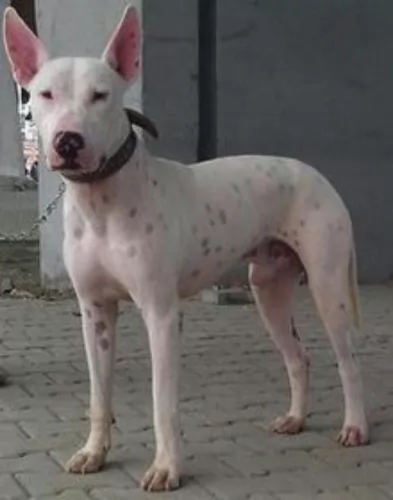 The Gull Terr hails from Pakistan. Having been introduced to the country by the British Raj, the dog has always been valued for its guarding and fighting abilities.
The Gull Terr hails from Pakistan. Having been introduced to the country by the British Raj, the dog has always been valued for its guarding and fighting abilities.
The British army, on bringing English Bull Terriers with them, mated them with local dogs. The dog was in other words, created from the old bull terrier which became extinct, and the Bully Kutta.
The Gull Terr or Pakistani Bull Terrier as he is known is a rare breed of dog. Today they are usually found in rural areas of Pakistan as well as in the Indian Panjab area, becoming popular as both pet and watchdog. It is no longer used for dog fighting as this has been banned.
 The Shetland Sheepdog was crossed with working collies and brought to the islands. They were bred on the Shetland Islands, United Kingdom.
The Shetland Sheepdog was crossed with working collies and brought to the islands. They were bred on the Shetland Islands, United Kingdom.
These little dogs have always been particularly valuable to farmers who used them to herd their sheep.
During the early 20th century other crosses occurred an in 1909 and the little dog received recognition by the English Kennel Club. The first Sheltie to be registered by the American Kennel Club was in 1911.
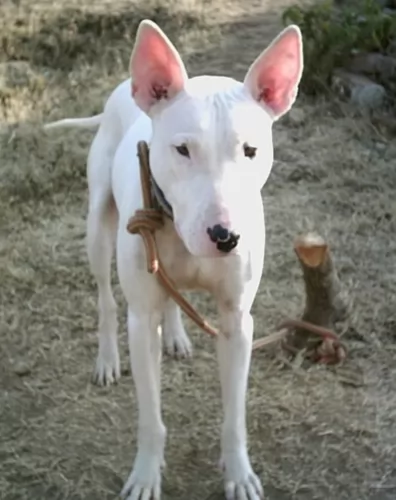 As a medium sized dog, the muscled Gull Terr stands as 45 – 66cm in height and weighs in the area of 40 – 45kg.
As a medium sized dog, the muscled Gull Terr stands as 45 – 66cm in height and weighs in the area of 40 – 45kg.
The dog has a short, smooth coat which is white, but you may find some black spots on him. He has a egg shaped head, ears are naturally erect, dark slanted eyes, and he has a long tail which is held upwards. Muscled and agile, he is a powerful working breed and makes a good watchdog.
This is an aggressive dog breed, and first-time dog owners might want to have a more amicable kind of pet to start off with.
He is a fearless dog, somewhat aggressive and suspicious towards strangers and therefore wants to protect his owner from them. With training and socialization he can be good with children in the home, although he is inclined to be boisterous and stubborn. He has fierce protective instincts, even though he is considered not as aggressive as some other Pakistani dog breeds.
The Gull Terr will need an experienced dog handler. Even though he has been a fighter in his day, he is capable of being an excellent family pet as well. You won't have trouble training him as he is intelligent. He then becomes more obedient and more manageable. He is a very active dog and therefore he won't fit into city dwelling where there are small spaces. He needs a place to run and on top of that he will require a good deal of exercise.
 The small Shetland Sheepdog stands at between 33 to 41cm and weighs roughly between 6 and 12kg for both males and females. The long double coat of this dog sheds consistently, he will need to be brushed regularly.
The small Shetland Sheepdog stands at between 33 to 41cm and weighs roughly between 6 and 12kg for both males and females. The long double coat of this dog sheds consistently, he will need to be brushed regularly.
The coat is golden, black or a steel grey color with white. The ears are erect and the tail long and feathery and the expression on this dogs face is sensitive, alert and gentle.
Shelties make wonderful pets for their human families and are great with children too. They’re protective, making good watchdogs. They are somewhat wary around strangers.
Smart and alert, you can train this little dog plenty of tricks because he is quick to learn. They’re such agile little dogs and are great athletes. It’s always a good idea to keep such a smart little dog busy so he doesn’t become bored.
He is able to adjust to life in the city or the countryside, so long as he is kept busy, otherwise he takes to a piercing kind of bark.
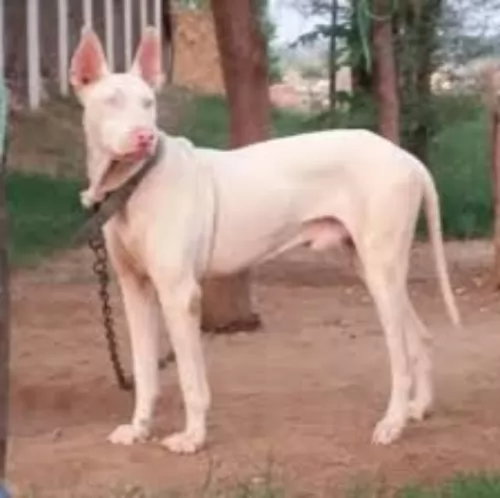 Your Gull Terr love the attention he receives from his human family and he won’t flourish at all if he is put into the back yard for watch dog purposes only. He is a dog that needs to come indoors to be with his family.
Your Gull Terr love the attention he receives from his human family and he won’t flourish at all if he is put into the back yard for watch dog purposes only. He is a dog that needs to come indoors to be with his family.
He tends to be somewhat aggressive and this is why he isn’t looked upon as the ideal pet for first-time dog owners and those with young children in the home.
He is a confrontational dog, willing to enter into a fight with provocation. Strong willed he will require early training and socialization, and when he is brought up by a firm, consistent, kind owner, he can get over his aggression and become a loyal, devoted, protective and loving pet.
 You’re certainly not going to have one dull moment with the Shetland sheepdog – its such a lively, intelligent, entertaining, playful and also eager to please - that's your Sheltie.
You’re certainly not going to have one dull moment with the Shetland sheepdog – its such a lively, intelligent, entertaining, playful and also eager to please - that's your Sheltie.
They also have a gentle, quiet side. They love the company of their human family and are able to adapt to life in the city or countryside, so long as he gets lots of attention and exercise.
They’re highly strung dogs, and an excitable child can get them barking in a high pitched way which wont be good if you live close to your neighbors.
Shelties are essentially peaceful dogs who prefer a home where its quiet and orderly. If you give this dog what it needs, just like you would for any family member of yours, you’ll be blessed with an awesome pet and companion.
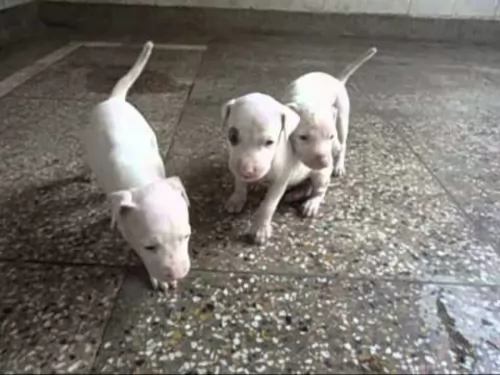 The Gull Terr has a deep chest and this means he is more prone to bloat, a condition known as gastric dilation volvulus.
The Gull Terr has a deep chest and this means he is more prone to bloat, a condition known as gastric dilation volvulus.
Your pet's stomach fills with air and this leads to decreased blood flow to vital organs. The stomach can twist and this is when the condition becomes life threatening as blood supply to the stomach is cut off. Instead of feeding him large meals, feed him smaller meals more frequently.
Deafness in your pet can be temporary or permanent, in one ear or both. There are are so many reasons why your pet could be deaf and it could be a birth defect, an infection or old age. Certain dogs such as the white coated Gull Terr are also more predisposed to congenital deafness.
Get him to the vet who will examine your dog’s ear canal for wax and debris and discuss the way to go for your beloved pet.
 Every dog, no matter how healthy, can succumb to any one of the many dog illnesses there are.Some of the dog illnesses to look out for include cancer, bloat, ear infections, dental problems, hypothyroidism, skin allergies and obesity among others.
Every dog, no matter how healthy, can succumb to any one of the many dog illnesses there are.Some of the dog illnesses to look out for include cancer, bloat, ear infections, dental problems, hypothyroidism, skin allergies and obesity among others.
This illness occurs when the dog’s body doesn’t maintain sufficient levels of thyroid hormones. Your pet will be sensitive to the cold, the thick hair will be thinning and there will be weight gain. It will be wise to have your dog checked out by your vet as this is an ailment which can be managed with medication.
This is an inherited condition that can lead to blindness in some dogs. It can occur in both eyes. It can be diagnosed by your vet but regrettably there is no treatment. Not spaying or neutering your dog will mean that if the have puppies the gene can be carried down to the puppies.
This is an inherited disorder that can cause skin lesions but also affect the muscles. Skin lesions can appear on the head and the front legs and there can be hair loss.
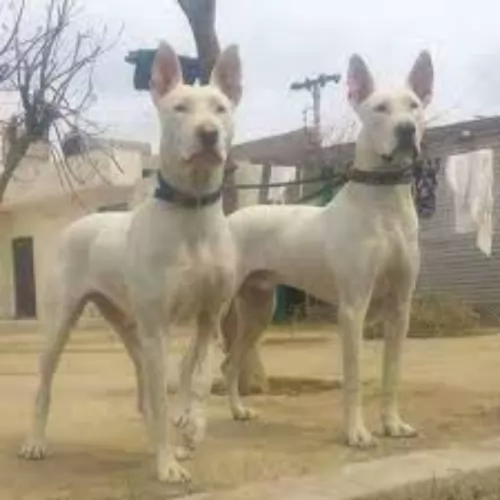 Easy to look after with his short coat, the Gull Terr will only require a brushing twice a week to keep the coat shiny and healthy.
Easy to look after with his short coat, the Gull Terr will only require a brushing twice a week to keep the coat shiny and healthy.
Because his coat is white, it can show dirt easily, and it will simply require taking a damp cloth and wiping the mark off him. You don't want to be bathing him often as this dries his skin out – rather just wipe the coat down.
Your Gull Terr is a highly energetic dog and he loves nothing more than to be involved in robust exercise and games. He is best suited in a home with large grounds and if you do opt to have him in the city, you will have to pay close attention to his exercise needs – lots of walks, runs, ball games, swimming and running with you as you cycle.
You want to be sure that your energetic Gull Terr has a healthy diet full of important proteins, fats, and carbohydrates.
Protein is always important for a dog like this and you want to make absolutely sure that apart from his high quality kibble, you mix in raw meat from time to time as well as cooked chicken, fish, brown rice and vegetables.
When looking for a commercially manufactured dog food, look for high-quality animal protein as a top ingredient. Make sure he always has fresh, cool water available to him.
 These little dogs have always been farm dogs and they will need a lot of exercise. Even so, with their small size, they can adapt to life in the city or the countryside, but will always need exercise.They love going for walks and playing games with the kids.
These little dogs have always been farm dogs and they will need a lot of exercise. Even so, with their small size, they can adapt to life in the city or the countryside, but will always need exercise.They love going for walks and playing games with the kids.
Your Sheltie will need brushing every day because the hair can so easily pick up leaves, twigs and burrs. In the warmer months some people prefer to trim the coat themselves or take the dog along to a professional groomer.
It is best to feed adult dogs two meals a day instead of one. One can make your dog want to gobble up his food too quickly and this can result in a life threatening condition known as bloat.
How much any adult dog eats will depend on his size, his age and his activity levels.The quality of dog food you buy also makes a huge difference – the better quality the food, the more satisfied your Sheltie will be.
Some of the best commercially manufactured dog foods are convenient and they can be good if you go with the best brands that have high levels of vitamins and minerals in them. Dry kibble can be made more enticing when you add some homemade food into it.
Boiled chicken, sweet potatoes, brown rice or pasta, carrots and spinach will do him the world of good. Chop it up and add small portions to the kibble about twice a week. His wagging tail and prancing antics will be all the thanks you need.
Some raw meat added in occasionally will also contribute to your pet’s heath. Make sure he is never without a constant supply of fresh, cool water.